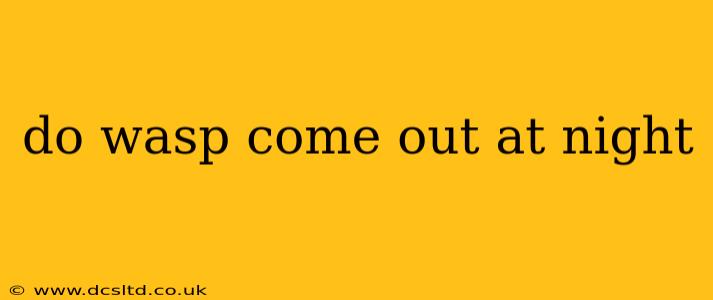Wasps are fascinating insects, but their stinging capabilities make many people wary. A common question many have, especially those with a fear of wasps, is whether these buzzing creatures are active at night. The simple answer is: it depends on the species of wasp. Most wasps are diurnal, meaning they are active during the day. However, some species exhibit nocturnal behavior, or at least crepuscular behavior (active during twilight hours).
What Wasps Are Active at Night?
While the majority of common wasps nest and forage during daylight hours, some species, particularly certain solitary wasps, are active at night. These nocturnal wasps often have adaptations to help them navigate and hunt in low-light conditions. For example, they might have enhanced senses of smell or hearing to locate prey. Identifying the specific species is crucial to determining its activity pattern.
Are All Wasps Nocturnal?
No, definitely not! The vast majority of the wasps you're likely to encounter are diurnal. Social wasps, like yellow jackets and paper wasps, are primarily active during the day, returning to their nests at night. Their activity is strongly linked to the availability of food sources, which are usually more accessible during daylight.
Why Are Most Wasps Active During the Day?
The primary reason most wasps are active during the day is linked to their foraging behavior. Most wasps are predatory or parasitic, relying on the sun's light for effective hunting and navigating. Their prey, such as caterpillars, aphids, and other insects, are also generally more active during the day. The warmth of the sun also helps with their metabolism and flight capabilities.
What Attracts Wasps at Night?
While most wasps aren't actively foraging at night, certain factors might attract them to areas even after dark. These include:
- Light sources: Like moths, some wasps can be drawn to artificial lights, particularly bright ones.
- Sweet scents: Residual smells of sugary drinks or food can attract wasps, even if the source is no longer present.
- Nest disturbance: If a wasp nest is disturbed at night, the wasps inside might emerge defensively.
Do Wasps Sleep?
While wasps don't sleep in the same way humans do, they do have periods of inactivity at night. Social wasps typically congregate within their nests at night, exhibiting a state of rest. Solitary wasps might seek shelter in crevices or under leaves. This period of rest allows them to conserve energy and prepare for the next day's activities.
Are Nighttime Wasp Encounters Common?
Although nocturnal wasp activity is less common than daytime activity, encountering a wasp at night is still possible. These encounters are usually accidental, perhaps due to a wasp being attracted to a light source or disturbed from its resting place.
How to Avoid Wasp Encounters at Night
Taking precautions to minimize encounters, even at night, is always a good idea:
- Keep lights off or use low-wattage bulbs: This reduces the attraction of light-sensitive insects.
- Secure food and drinks: Store food and sugary beverages tightly to prevent attracting wasps.
- Be cautious around potential nesting sites: Avoid areas where wasp nests might be present, particularly at dusk and dawn.
Understanding the nocturnal behavior of wasps helps to mitigate any fear or apprehension surrounding these insects. While most species are not a threat at night, being aware of their potential activity and taking simple precautions can ensure a peaceful coexistence.
